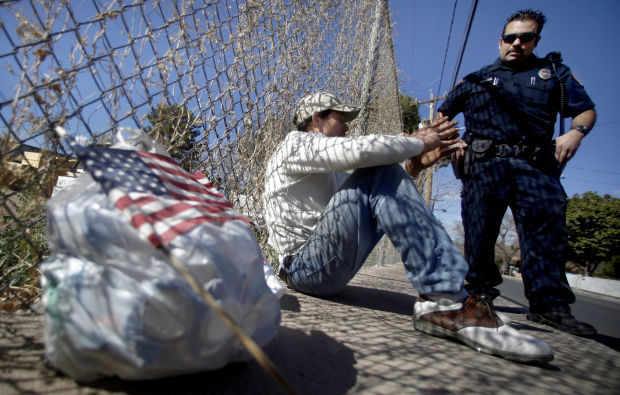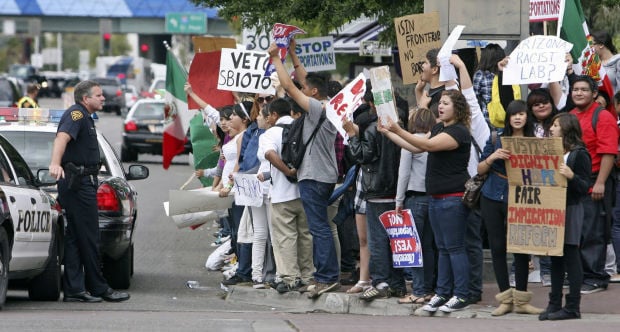SB 1070 was supposed to standardize local immigration enforcement across ûÜÒøøÝýË.
But more than a year after the lawãs most controversial provision took effect, it is impossible to tell whether the law is making a difference ã or even being followed.
An ûÜÒøøÝýË analysis of thousands of records from 13 Southern ûÜÒøøÝýË law-enforcement agencies reveals a patchwork of immigration-enforcement policies and data so incomplete thereãs no way to determine how police are implementing the law, or whether they are committing the systemic civil-rights violations opponents feared when SB 1070 was passed.
A provision of the law that took effect in September 2012 requires local law enforcement to try to check the immigration status of anyone they stop if they come to believe those suspects are in the country illegally.
People are also reading…
But police still donãt regularly keep records of those checks. The few agencies that do rarely have a system for analyzing the data for patterns. And oversight is almost nonexistent.
Thatãs how the Legislature intended it. Lawmakers advancing the bill in 2010 considered data-collection requirements but decided against them out of worry that further burdening law enforcement would peel away ãyesã votes and torpedo the measure, said Rep. John Kavanagh, one of the billãs major proponents.
As a result, most law-enforcement leaders decided not to bother with collecting data since immigration isnãt their primary responsibility. Some also worried about getting sued ã a clause in the bill gives state residents the power to take legal action if they suspect an agencyãs enforcement is too lax. That same worry led some departments, such as ûÜÒøøÝýË Police, to create a form for each immigration inquiry.
ãIn our discussions, we thought, ãAre we opening a Pandoraãs box here by keeping numbers?ãã ûÜÒøøÝýË Police Chief Roberto VillaseûÝor said. ãLetãs say we didnãt keep numbers and someone wanted to sue us, saying youãre not enforcing it. How do I refute that?ã
Broad documentation inconsistencies exist across agencies, and sometimes within them. Not even the Border Patrol can provide a full picture.
Records that are available show police calling the Border Patrol for offenses ranging from having an or broken taillights to trying to pass off a fake ID or leaving the scene of a crash. Several people were detained at least an hour waiting for agents, even though the Supreme Court said they should not be held beyond the length of a typical traffic stop.
The reports donãt begin to settle the debate over whether the law encourages racial profiling or illegally long detentions ã two key issues justices said they might reconsider when they let the so-called ãshow me your papersã provision take effect.
In this void of information, supporters proclaim the law a success at deterring illegal immigration, and critics blast it for encouraging civil rights violations ã all without evidence beyond the anecdote.
THE STARãS FINDINGS
The Star reviewed data and incident reports describing three years of referrals to Border Patrol and interviewed nearly every agency leader in Southern ûÜÒøøÝýË to trace the lawãs effects.
Among the newspaperãs findings:
- In many ways, SB 1070 is business as usual: All of the agencies the Star reviewed reported more referrals to Border Patrol in the years before SB 1070ãs immigration check requirement than the year after it. Most said their policies were largely unchanged.
- Oversight is lacking: Agencies rely on complaints and sergeantsã communication with officers to monitor trends and identify problems. None regularly reviews immigration-related enforcement.
- No uptick in apprehensions: Border Patrol data show that apprehensions based on calls from other agencies decreased from fiscal year 2007 to 2013, in line with the overall dropoff in apprehensions as the economy sputtered.
- Apprehension doesnãt equal deportation: More than 1 in 5 people referred to Border Patrol by another law-enforcement agency remain in the country while their case is pending.
HARDER THAN IT SEEMED
The aim of SB 1070 was to reduce the number of people living in the state illegally and to discourage others from coming.
ãIt was one-third statement of protest, one-third deterrent and one-third good enforcement,ã said Kavanagh, a Republican representative from Fountain Hills.
At last estimate, in 2010, about 400,000 immigrants without legal status lived in ûÜÒøøÝýË. The group topped out at roughly 7 percent of the stateãs residents, but as their numbers tripled over two decades, it unsettled enough ûÜÒøøÝýËns to push the issue into the spotlight. SB 1070 was legislatorsã response.
Many of those caught in the system have deep roots in ûÜÒøøÝýË, and deporting them ã especially those who have raised families here ã takes more than a state law.
Statewide data from the Department of Public Safety, the only agency to uniformly collect information about SB 1070ãs effects, show the immigration-check mandate is diluted by layers of local and federal discretion.
About half of the people officers suspect of unlawful status ever made it into federal custody, and even some of them wonãt be deported. Many people with strong ties to the United States appeal their case before an immigration judge ã a process that often stretches for years.
In the last fiscal year, judges ruled in favor of immigrants about half the time, a report from Transactional Records Access Clearinghouse at Syracuse University shows.
Monica HernûÀndez was heading home from church in Nogales, Ariz., when because the red lights on the back of her pickup werenãt illuminated. The officer asked for her driverãs license, which she said she didnãt have because she was in the process of legalizing her status.
He cited her for driving without a license and gave her a warning about the taillight. Within two minutes, the Border Patrol was there.
The wife of a legal permanent resident and mother of three U.S. citizen children, HernûÀndez considered leaving the state she has called home for 18 years after she got pulled over.
But the native of Nogales, Sonora, stayed because of her children, who have lived their entire lives in ûÜÒøøÝýË. Her oldest son, Moises, is a football player at Nogales High School and participated in the Border Patrol Law Enforcement Explorer Program. Her middle child, Daniela, plays in her schoolãs marching band. Her youngest, Sophia, does her homework in a Cinderella-themed bedroom.
ãYou build your life here. Your childrenãs lives are here,ã said HernûÀndez, whose case is pending. She paid a $5,000 bond and was released from the Eloy Detention Center a few days after she was detained.
The officer who pulled her over was following SB 1070 and had no choice but to call Border Patrol, said Nogales Police Chief Derek Arnson.
ãIf SB 1070 did not exist, the outcome might have been different,ã he said.
LIMITED OVERSIGHT
Most law-enforcement chiefs have only a small window into how their officers and deputies are applying the law.
The oversight system in nearly every Southern ûÜÒøøÝýË agency hinges on public complaints and a sergeant reading and approving the reports of the officers beneath him. But reports with as little as two lines of information often get through.
Pima County Sheriff Clarence Dupnik said he relies heavily on complaints and the press for information about whether his deputies are enforcing the law constitutionally. ãIf we have an issue of some kind, then we deal with it,ã he said.
But a system so reliant on complaints is unlikely to provide robust oversight, said Robert Worden, director of the John F. Finn Institute for Public Safety and professor of criminal justice and public policy at the University of Albany.
People file complaints on 5 percent to 10 percent of the cases in which they believe police behaved improperly, Worden said. Activists argue that immigrants are even less likely to complain because many come from countries where police have nearly unbridled power. Some fear complaining could lead to their or their familyãs deportation.
Statistical analysis, especially of traffic-stop data, has gained favor as a way for chiefs to spot problems without having to wait for a complaint ã or worse, a lawsuit.
In the past decade, the courts required such reviews of both major ûÜÒøøÝýË agencies accused of racial profiling ã Maricopa County and DPS. Now it is a regular practice at the countryãs largest departments.
VARIED INTERPRETATIONS
Gov. Jan Brewer required that every ûÜÒøøÝýË cop watch a 94-minute training video produced by the stateãs peace-officer certification board. But that hasnãt settled disputes over whose status should be checked.
In June, a couple ended up in Border Patrol custody after a Sahuarita police officer stopped them because the license-plate light on their pickup truck wasnãt visible from the state-required 50 feet.
The driver, Laura Rocha, gave the officer her ûÜÒøøÝýË driverãs license. She had no warrants and her driving privileges were in good standing. The officer also asked her passenger, Josûˋ Lû°pez, for his identification, even after Rocha explained he was her husband.
Lû°pez showed a Mexican ID, the police report said. The only other thing in his pocket was a receipt from the federal government of his petition to legalize his status.
Using the computer in the patrol car, the officer found a record showing the Border Patrol had deported someone with the same name and date of birth, so he called the federal agency.
Agents arrived and took custody not only of Lû°pez, but also of Rocha, on suspicion she was an ãimmigration violator.ã
Passengers and pedestrians arenãt required to carry ID or to answer questions if they are not suspected of a crime, but few know that, said James Lyall, an attorney with the American Civil Liberties Union in ûÜÒøøÝýË.
Several law enforcement leaders said itãs good practice to identify everyone in a vehicle in the interest of officer safety. But Daniel Sharp, Oro Valley chief and a TPD veteran, discourages the blanket practice because, to him, a traffic stop concerns only the driver.
Disagreement also reigns about whether crime victims and witnesses should be exempt from checks.
The ACLU and activist groups want law-enforcement agencies to issue a policy protecting victims and witnesses from questions about immigration status.
TPD Chief VillaseûÝor is among those who refuse. Although he fears the lawãs effect on community trust, he said an across-the-board exemption would open the city to a lawsuit under the clause that lets people sue if they think the law is not being fully enforced.
Kavanagh, the state representative, said the billãs intention was to punish lawbreakers and he doesnãt think anyone would question a policy protecting victims.
DISPUTE OVER DISCRETION
The law gives officers an out in cases where checking immigration status could jeopardize an investigation or is not doable.
But there is no consensus among the 13 agencies in the Starãs review over how much leeway that actually gives officers.
VillaseûÝor thinks officers must call immigration authorities on every arrest.
ãI donãt understand anyone who says that it hasnãt affected discretion of officers,ã he said. ãThe only way officers still have discretion is if they ignore the law.ã
But at other agencies, deputies are still told to use their judgment.
ãOur officers have discretion to enforce any law they are required to enforce,ã Dupnik said. ãIf we didnãt, we would be a Gestapo organization.ã
DPS ã the only agency whose records are comprehensive enough to reveal patterns in discretion ã showed officers didnãt check the immigration status of about 40 percent of the people they suspected were here illegally.
Many officers considered a lack of ID to be adequate grounds to contact immigration authorities, but others wrote that the same set of facts did not reach the threshold to force a call.
One DPS officer didnãt find the standard met any of the eight times he stopped vehicles and suspected the occupantsã unlawful status ã although in each case they admitted to being in the country illegally.
Some officers declined to call because of children crying or pleading for leniency. In one case, an officer let a family go because the childãs soccer coach stopped to say the game was about to begin.
NO RISE IN APPREHENSIONS
Records show officers called Border Patrol frequently, even for minor infractions, before SB 1070 took effect.
Marco Quiroz-Quijada was after his chow mix got out while animal control and a ûÜÒøøÝýË County deputy were near his home outside Douglas.
Quiroz-Quijada was about to be cited and released when the pair asked for his ID. The Sonora native didnãt have one. He had crossed illegally through the desert and was in the process of legalizing his status through his wife, a U.S. citizen.
The deputy called Border Patrol, and Quiroz-Quijada was taken into custody.
ãI wasnãt expecting this,ã he said. ãI was being very careful, not having a steady job, trying not to drive because we didnãt want to take a risk ã and it still happened.ã
That was April 27, 2012 ã months before immigration checks were required.
The data the Star compiled suggest that SB 1070 hasnãt led to more people transferred to immigration authorities after first being detained by a local officer. There are, however, limitations to the information provided.
Most Southern ûÜÒøøÝýË departments record referrals to immigration officials by classifying the incident as an assist to another agency. That leaves out cases where a person was charged with a more serious state crime.
The Starãs data also is missing stops where officers didnãt give a citation or written warning but still called Border Patrol. Agencies couldnãt provide a paper trail to show how often this happened and whether agents responded. No agency kept a tally of people referred.
The Border Patrol couldnãt provide the number of calls it received from other agencies or break down by department the number of people it took into custody.
However, apprehensions stemming from referrals from other agencies have been dropping along with total apprehensions. They plummeted from a high of about 10,000 people annually in the ûÜÒøøÝýË and Yuma sectors to about 1,300 in the fiscal year ending Sept. 30.
The pattern is not much different in ûÜÒøøÝýËãs northern reaches. Immigration and Customs Enforcement, the primary immigration agency for areas farther from the border, hasnãt seen anything close to the boom in calls it anticipated when SB 1070 was under debate.
Its Phoenix office received less than half the calls in the last fiscal year than it did two years earlier. And ICEãs requests for local jails to hold inmates it wants to deport fell also, to 13,000 last fiscal year, about 3,000 fewer than two years before.
The recession makes it hard to assess the effect of SB 1070, as many unauthorized workers left for a lack of jobs. But for his part, Kavanagh declares the law a success and thanks activists for over-exaggerating the possible effects and deterring unauthorized workers from coming to ûÜÒøøÝýË.
The lawãs true effects will be clearer, he said, when the economy recovers and the jobs return. ãYou canãt deter someone who is not coming,ã he said.
NO WAY TO TRACK TRENDS
Despite warnings that SB 1070 would boost public scrutiny, few agencies store relevant information in an easily retrievable way, and none analyzes it. Even at agencies that try to keep tabs, cases are lost in the shuffle.
On weekends when he is not able to turn up a construction job, Manuel Flores rides the shuttle from ûÜÒøøÝýË to Nogales to talk with his wife, Kenia, through the border fence that divides them.
Kenia Flores was deported to Mexico after the two were pulled over in a traffic stop on their way to El Super grocery store on South Sixth Avenue in August 2012. The ûÜÒøøÝýË police officer referred them to Border Patrol to check their immigration status.
Manuel Flores asked to see a judge to appeal his case, but Border Patrol apparently didnãt get the same request from his wife, and she was deported.
The Border Patrol has a record of picking up the couple from a ûÜÒøøÝýË officer, but ûÜÒøøÝýË police could not find a document related to the stop of Flores, who spent three months at Eloy Detention Center until he paid a $3,500 bond.
He also lost the pickup truck the officer impounded because he couldnãt reclaim it within the 30-day window. Thereãs no record of the impoundment that day, either.
After SB 1070, ûÜÒøøÝýË police created a form the dispatcher fills out when an officer requests an immigration check. But itãs handwritten on paper so the files canãt be easily searched.
The forms donãt capture every call to Border Patrol because some officers use their cell phone, leaving dispatchers with no record the inquiry ever happened.
There are also problems linking forms to other details about the incident. The departmentãs traffic citation software uses case numbers that donãt match those assigned to the incident report or dispatch form.
As a result, for the single dayãs worth of reports the Star requested, TPD could only provide partial summaries with the reason for each traffic stop listed as unknown.
THE CASE FOR DATA
The only way to accurately gauge SB 1070ãs effects is to collect data.
Thatãs beginning to gain traction. As a result of the Starãs investigation, the Douglas Police Department directed its officers to document every encounter with a person suspected to be in the country illegally and whether Border Patrol responded.
The South ûÜÒøøÝýË Police Department, which was only able to retrieve one immigration-related case based on the Starãs request, pledged to improve its practices and to classify reports in a way that can be searched and analyzed.
ûÜÒøøÝýË police are considering changes under direction from the City Council.
Statewide, the Civil Rights Advisory Board is pushing for better data collection and more frequent reviews of ûÜÒøøÝýË law-enforcement agencies. The board will ask the governor to advocate for a data mandate, said its chairman, Jeff Lavender.
Recent court decisions have driven the point home. Maricopa County Sheriffãs Office, found guilty of racial profiling in October, is overhauling its documentation.
Despite its headline-grabbing embrace of immigration enforcement, Maricopa County recorded only about 10 percent of its referrals because deputies did most inquiries by cellphone, leaving no paper trail, spokesman Lt. Brandon Jones said. The department recently rolled out a new form on which deputies record the perceived race of a driver both before and after a traffic stop.
ãThat was the problem before,ã Jones said. ãWe had no record that we werenãt racially profiling.ã
Without data, law-enforcement chiefs canãt disprove allegations based on patterns and are unlikely to see the big picture: how their orders are being carried out, whatãs working and what impact theyãre having on the community.
ãData,ã civil rights board chairman Lavender said, ãis difficult to argue against.ã
Star reporters Becky Pallack and Darren DaRonco and Star apprentices Britain Eakin and Amer Taleb contributed research for this story.
Contact reporter Perla Trevizo at 573-4213 or ptrevizo@azstarnet.com and reporter Carli Brosseau at 573-4197 or cbrosseau@azstarnet.com.











